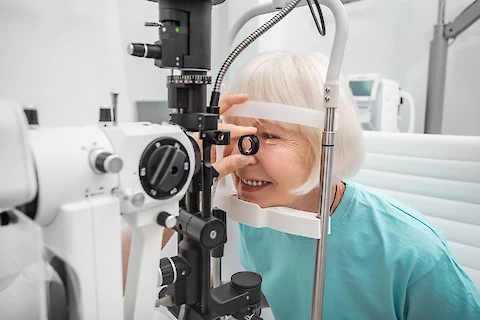
August is National Eye Exam Month. It is an important time to emphasize the significance of regular eye checks, especially for seniors. Since our eyes become more susceptible to various conditions as we age, scheduling regular eye exams is an absolute must. But for some seniors, the standard eye-check schedule might not suffice. If your relative has a history of eye conditions or is showing signs of eye health issues, they might need to see the optometrist a bit sooner than planned. This Senior Helpers blog post discusses the signs that may indicate the need for an earlier-than-usual eye exam.
The Need for Early Eye Exams
Eye health is a vital aspect of general well-being, particularly in our senior years. The risk of developing eye conditions like glaucoma, cataracts and age-related macular degeneration increases as we grow older. Regular eye exams are important for detecting these conditions early when they are most treatable. However, some seniors may need to schedule their eye exams earlier than the typical one or two-year interval. Neglecting changes to eye health can lead to serious complications, including vision loss, decreased quality of life and increased risk of falls or accidents.
4 Signs To Look Out For
Here are some key indications that your senior loved one may need an early eye exam:
1. Change in Vision
The first thing to pay attention to is a noticeable change in vision. If your senior relative mentions that things look blurry, or if they are having trouble reading or seeing objects at a distance, it is time to book an eye exam.
2. Sensitivity to Light
Keep an eye out for increased sensitivity to light. If your relative finds bright light uncomfortable or sees halos around lights, it could indicate an underlying condition like cataracts.
3. Headaches
Frequent headaches are also a common sign of eye problems. If your relative experiences more headaches than usual, it might be due to straining their eyes or changes in their prescriptions. It is a good idea to check with the optometrist.
4. Family History
Seniors with a previously diagnosed eye condition or a family history of eye disease should make sure to schedule regular check-ups to monitor their eye health. They are at a higher risk of developing eye problems in their senior years.
The Role of Caregivers in Eye Health
As a caregiver, you play a critical role in your senior relative's eye health. By staying vigilant to the signs, you can act quickly if any changes arise. It is also essential to encourage seniors to discuss any visual changes or discomfort they may be experiencing. Many seniors may downplay their symptoms or believe that vision loss is a standard part of aging, but early detection and treatment can significantly improve outcomes.
Remember to support your loved ones in maintaining their eye health. This can be as simple as ensuring they have the right lighting at home, encouraging them to wear sunglasses for protection against UV rays or reminding them to take breaks while reading or watching television.
Senior Helpers Cares About Eye Health
Senior Helpers provides quality, in-home senior care customized to meet the individual needs of the community. If you live in the Anderson, Easley, Seneca or Pickens areas, contact us today at Senior Helpers Anderson, SC. We are happy to help you maintain optimal eye health.